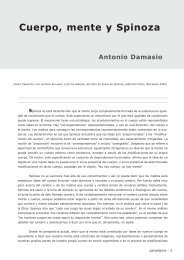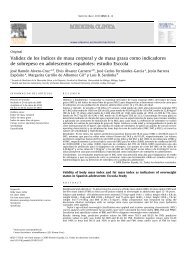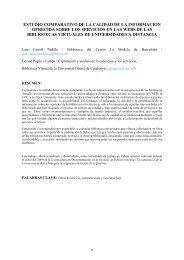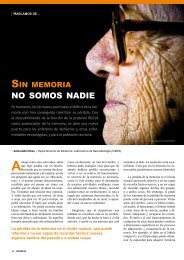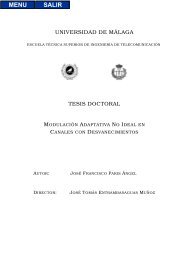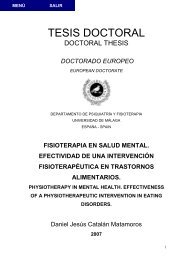Estereotipos negativos hacia la vejez y su relación con variables ...
Estereotipos negativos hacia la vejez y su relación con variables ...
Estereotipos negativos hacia la vejez y su relación con variables ...
Create successful ePaper yourself
Turn your PDF publications into a flip-book with our unique Google optimized e-Paper software.
Referencias<br />
Canetto, S., Kaminski, P. y Felicio, D. (1995). Typical and optimal aging in women and men: Is there<br />
a double standard? International Journal of Aging and Human Development, 40(3), 187-207.<br />
Cañas, G. (2003). La discriminación por edad es <strong>la</strong> que más <strong>su</strong>fren los ciudadanos europeos. En El<br />
Pais, 17 de junio, 2003).<br />
Caporael, L. R., Lukaszewski, M. P. y Culbertson, G. H. (1983). Se<strong>con</strong>dary baby-talk: Judgements by<br />
institutionalizad elderly and their caregivers. Journal of Personality and Social Psychology,<br />
44(4), 746-754.<br />
Cardenal, V. (1999). Auto<strong>con</strong>ocimiento y <strong>la</strong> autoestima en el desarrollo de <strong>la</strong> madurez personal.<br />
Má<strong>la</strong>ga: Ed. Aljibe.<br />
Carmines, E. G. y Zeller, R. A. (1979). Reability and Validity Assement. Beverly Hills, CA: Sage.<br />
Carp, F. y Carp, A. (1983). Structural stability of well-being factors across age gender, and<br />
development of scales of well-being unbiased for age and gender. Journal of Gerontology,<br />
38(5), 572-581.<br />
Carstersen, L. L. (1992). Social and emotional patterns in adulthood: Support for socioemocional<br />
selectivity theory. Psychology and Aging, 7, 331-338.<br />
Cartersen, L. L. y Freund, A. M. (1994). The resilience of the Aging Self. Developmental Rewiew, 14,<br />
81-92.<br />
Cartersen, L. L. y Edelltein, B. A. (1997). El envejecimiento y <strong>su</strong>s trastornos. Barcelona: Ed. Martinez<br />
Roca.<br />
Carstensen, L., Isaacowitz, D. y Charles, S. (1999). Taking time seriously: A theory of socioemocional<br />
selectivity. American Psychologist, 54, 165-281.<br />
Carver, C. S. y Scheier, M. (1981). Attention and self regu<strong>la</strong>tion: A <strong>con</strong>trol- theory approach to<br />
human behavior. New-York: Springer-Ver<strong>la</strong>g.<br />
Carver, C. S., Scheier, M. y Weintraub, J. K. (1989). Assessing coping strategies: a theoretically based<br />
approach. Journal of Personality an Social Psychology, 56, 267- 283.<br />
Carver, C. S. y Bridges, M. W. (1994). Distinghing optimism from neuroticism (and trait anxiety,selfmastery,<br />
and self-esteem): a reevaluation of the Life Orientation Test. Journal of Personality<br />
and Social Psychology, 67, 1063-1078.<br />
Carver, C. S. y Scheier, M. (1990).Origins and functions of positive and negative affect: A <strong>con</strong>trolprocess<br />
view. Psychological Review, 97, 19-35.<br />
Caryk, C. y Walker, J. (1986). Optimism and irrational beliefs. Psychological Reports, 59(2), 457-458.<br />
Caspi, A. y Elder, G. (1986) Life satisfaction in old age: Linking social psychology and history.<br />
Journal of Psychology and Aging, 1, 18-26.<br />
Cerdá, R., Hidalgo J. L., O<strong>la</strong>no, C. F., Verdejo, M. A. y Puime A. O. (1997). Depresión en personas<br />
ancianas. Factores asociados. Atención Primaria, 13,12-17.<br />
213




